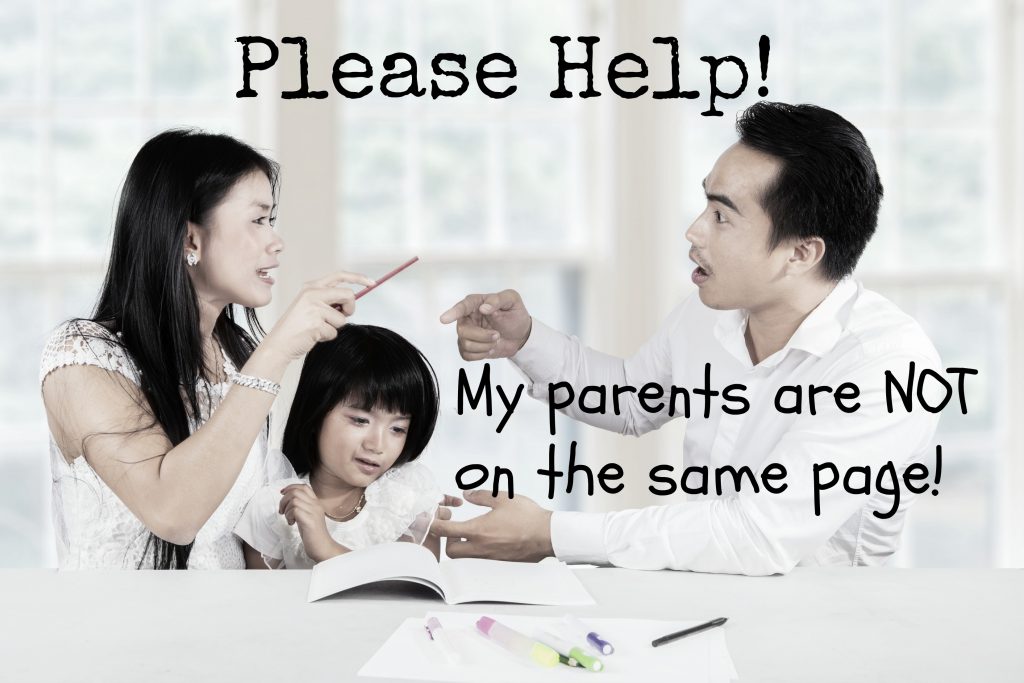Podcast: Play in new window | Download
Subscribe: RSS
A week ago, I spent a week traveling the east coast with my daughter and 5 grandkids. We visited my son-in-law Joshua at his army base. We had a wonderful trip! I had the opportunity to observe a military couple operate as partners in parenting. I was very impressed to see how they function on the same page when together or apart. It’s not easy, but they find a way to make it happen.Being on the same page is not easy!
Couples often struggle getting on the same page when it comes to parenting their kids. They have differences about parenting styles. One might believe his/her approach is better. A power struggle for control over parenting develops. Criticism, interference, overruling, or undermining behaviors divide parents even further. Kids observe the division and use it to their advantage. Bedlam results. Sound familiar? How do couples end up on opposite sides? Several factors contribute to the struggle. Let’s take a look at some of the things that cause parents to be on a different page when it comes to raising kids.Family background
Family-of-origin contributes significantly to how most people parent their kids. We often repeat patterns we learned growing up. Some adopt approaches quite the opposite of their parents. They vow that they will not allow their kids to experience the hardship they did by poor parenting.Expectations about roles
Couples often approach parenting with unspoken expectations about roles. Assumptions are made about who should be doing what and how it should be done. One’s cultural background may play a key role here. If you come from divergent backgrounds you may argue a lot about how to raise the kids.Gender differences
Males and females have different lenses by which they look at raising children. A father may view the mother as being “too soft”, while she may view him as being “too harsh” in parenting approach. Questions about who is the primary parent, who will sacrifice career, etc… can come under the umbrella of gender expectations about responsibilities.Attachment styles
How parents attach to children may be different. One may have a more nurturing attachment style. The other may be more detached. These often emerge from family-of-origin types of connection or ways of expressing sentiment.Fears about parenting
All parents experience some fear in parenting. We are afraid we will screw our kids up! Some experience exaggerated fear. Consequently, they put a lot of pressure on themselves and their kids to be perfect. A less anxious parent may argue that the other is overly-focused, controlling, and stressing the kids out.8 Agreements of Partners in Parenting
When parents fight they function more like opponents than partners in parenting. Kids don’t feel safe. Therefore, you have to find a way to come together. Here are 8 agreements partners in parenting make when it comes to raising their kids. [Tweet “When parents fight they function more like opponents than partners in parenting. Kids don’t feel safe. “]#1: Agree to stop criticizing the negative and compliment the positive
Criticizing each other only fuels the power struggle. Knock it off! Do what partners in parenting do. They start by complimenting the positive things each other does. If they have to address a problem, they do it respectfully.#2: Agree to learn your partner’s narrative on parenting
We have stories about growing up. These experiences shape how we see the world and how we view family life. Do you know the positive and negative experiences that influence your partner’s view of raising kids and what it means to be a mom or dad? I think couples can do a great service to parenting by taking time to listen to each other’s story. Listen without judging or correcting the faults of their family-of-origin. Your job is to listen and understand.#3: Agree to work on synthesizing your stories into a working narrative in your current family
Each of you may bring something of value that can be woven into the fabric of your family tapestry. For example, you may want to adopt the nurturing approach your wife gained in her family. You can also integrate the concept of chores your husband learned growing up.#4: Agree to stop correcting each other in front of the kids
Correcting the other parent in front of the kids is undermining their authority. You are teaching your kids to lose respect for him/her. If you have a problem have a sidebar discussion away from their eyes and ears.Don’t worry that children never listen to you; worry that they are always watching you. Robert Fulgum

